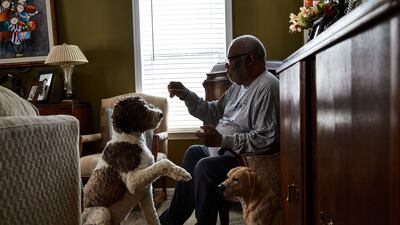The announcement this week that the UK has approved the so-called ”next generation” Moderna Covid-19 vaccine, which is capable of tackling both the highly transmissible Omicron variant and the original coronavirus strain, shows how quickly the world can move towards finding solutions to a pressing problem when there is an iron-clad will to do so.
The race to deliver effective vaccines to tackle the Covid-19 pandemic may well be remembered as one of the key events of the early 21st century. It was dramatic and ultimately successful, helping the world transition from red lists to green lights in mere months.
An upgrade in vaccines such as this may also signal a downgrade in the ability of the virus to keep complicating lives in communities around the world, although complacency or slow uptake for annual boosters may yet compromise some of that effort.
The UK is the first country to approve the new vaccine after its Medicines and Healthcare Products Regulatory Agency reviewed clinical trial data that revealed the jab triggered a strong immune response against both variants. Omicron is responsible for a majority of new cases globally, according to World Health Organisation data.
The expectation is that the vaccine will be tweaked and administered annually in the manner of a flu jab. Separately, the Serum Institute of India said this week that it will have developed its own Omicron-specific vaccine and have it ready for delivery within six months. Progressively, the same goal is being reached on multiple fronts.
Compare this with the troubled journey towards effective treatment for Alzheimer’s, the degenerative brain disease that typically affects older people.
WHO data estimates 55 million people live with dementia globally, with 10 million new cases identified annually. That figure may rise to more than 135 million within 30 years, most of which will require long-term care and treatment.
Perhaps if an Alzheimer’s dashboard was launched in the manner of the Covid-19 map that tracks cases across the world – one which reported daily dementia diagnoses, deaths and, more starkly, a recoveries figure consistently showing zero – then there may be more compulsion find lasting solutions for the degenerative disease.
No wonder David Cameron, former British prime minister and now president of Alzheimer’s Research UK, once termed dementia as the “quiet crisis” that creeps into people’s lives.
The economic consequences related to both funding the cost of care for the person living with dementia and the changes to the lives of caregivers, often close family members, can be dramatic and devastating.
While it is unfair and unscientific to draw a straight line between the race to develop viable vaccines in the pandemic and the crawl towards effective dementia treatment over several decades, it is right to point out that Covid-19 was met with a political will to take on the challenge. Years of rising numbers of dementia cases have, however, largely been greeted with a global shrug and a usually chastening reminder that more pressing needs can and do need to be attended to elsewhere.
Last summer, the US Food and Drug Administration approved the use of aducanumab or Aduhelm to treat Alzheimer’s. The UAE followed suit last autumn.
The drug’s developer, Biogen, said it would plug a significant unmet need for those living with dementia, although critics pointed out it was both a prohibitively expensive form of treatment – initially it was priced at around $4,000 a month as well as other costs on top – and its benefits in clinical trials were mixed. What the drug provided, in essence, was hope at a price rather than any degree of certainty.
When Aduhelm received its green light last year, I wrote in these pages that the US approval could almost be read as a “moonshot” that may help redouble efforts by other parties to find solutions to a growing crisis. The single most exciting element to its approval was that it may stir others into greater action in a space where more needed to be done.
The potentially game-changing nature of the drug was that it chose a different path: Aduhelm sought to attack and reduce deposits of amyloid plaques on the brain that impair memory once they accumulate. Other previously licensed inhibitor drugs only aim to slow cognitive decline not to turn back the tide altogether.
The gap between vision and reality has proved hard to bridge. Aduhelm has not reached many people in the US who needed it because health insurers were reluctant to underwrite its use when it cost so much to prescribe and the benefits to patients were apparently low. Others could simply not afford to fund their own treatment.
The lack of uptake has had several commercial consequences. Reuters reported in May that Biogen’s chief executive would soon step down. Other outlets have reported redundancies at the company and write downs of its Aduhelm inventory, suggesting the drug is no longer seen as a surefire best seller. The company’s share price, which surged after the FDA approval in 2021 to $395, was trading at $217 on Wednesday, although this year’s broader financial markets shock should be taken into context when reading those figures.
Last year’s apparent step forwards in the dementia crisis has turned into a stumble. While we are not back to square one, it does highlight once more that quiet crises rarely find quick or definitive solutions. In the context of Alzheimer’s, that needs to change.


